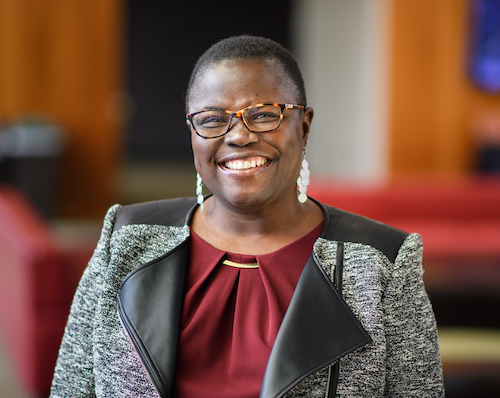How many tenured law professors are Black? Public data does not say

Kimberly Mutcherson, the co-dean of Rutgers Law School and an Antiracist Clearinghouse Project founder.
After unrest escalated across the nation following the killings of George Floyd and other African Americans by police, many law schools issued solidarity and anti-racism statements.
But a fair number of those institutions have few if any Black tenured professors, says Meera Deo, the author of Unequal Profession: Race and Gender in Legal Academia.
“We know from the little data available that there are very few tenured Black law professors in the U.S.,” she told the ABA Journal. “One of the key findings from my book is that the low numbers of Black tenured professors and other professors of color contribute to ongoing biases in legal academia.”
According to Deo and other legal academics, no legal groups publish the data. The information is also not available from the council of the American Bar Association’s Section of Legal Education and Admissions to the Bar, which the U.S. Department of Education recognizes as the national accrediting agency for law schools.
“It would be helpful to get this information in a disaggregated form. I don’t know if I personally would need to see at each law school how many Black professors there are, but even in an aggregate form, it would be helpful,” says Deo, a professor at Thomas Jefferson School of Law who is also the American Bar Foundation’s 2020-2021 William H. Neukom Fellows Research Chair in Diversity and Law.
The ABA does not collect data on law school tenure, according to Bill Adams, managing director of ABA accreditation and legal education; however, schools do report their number of minority professors, which is listed on annual 509 Reports. For the 2019 reports, there were 9,494 full-time professors at ABA-accredited law schools, 1,987 of whom identified as minorities.
Between 2000 and 2008, the Association of American Law Schools published statistical information including race, but it stopped because the organization received incomplete data, the AALS told the ABA Journal. It plans to resume having reports on law faculty in the future and is currently working with law schools to provide more complete data.
Also, in June, the AALS and a group of Black female deans started the Law Deans Antiracist Clearinghouse Project. Its website addresses listening, learning and leading with resource links and recommends including anti-racism in law school self-audits. Suggested questions include asking whether faculty demographics achieve representation; if promotion and tenure standards account for bias in evaluations; and if the school protects faculty against the racial bias of students, alumni and others.
On Oct. 29, the AALS announced that it will be giving its inaugural Impact Award to the clearinghouse founders, Kimberly Mutcherson, the co-dean of Rutgers Law School; Angela Onwuachi-Willig, dean of the Boston University School of Law; Carla D. Pratt, dean of the Washburn University School of Law; Danielle Holley-Walker, dean of the Howard University School of Law; and Danielle M. Conway, dean of the Penn State Dickinson Law.
The clearinghouse website links anti-racism and solidarity statements recently made by law school deans. Included are May 29 and June 12 diversity statements signed by Kim Yuracko, the former dean at Northwestern University Pritzker School of Law who in July announced she was moving to the university’s provost’s office as an associate provost for academic projects. At Northwestern Law, 75% of the tenure track professors are white, 8% are Black and students have been calling for more diversity, according to a July 9 Chicago Sun-Times article.
“One of the things I say to my faculty is, a lot of the story we continue to tell ourselves about who we are is not the story our students are telling,” says Mutcherson. She compares the situation to being a marathon runner. Just saying it, she explains, doesn’t make it true; you have to put in the training.
“For a long time, people have been able to get away with saying anti-racism matters when there isn’t any proof of that. That’s part of what’s happening right now, and it’s really powerful,” adds Mutcherson, the law school’s first Black gay female dean.
Among the ABA accreditation standards, Standard 206 calls for law schools to demonstrate “concrete action” showing commitment to diversity and inclusion. In July, the standards review committee for the ABA Section of Legal Education and Admissions to the Bar submitted an agenda memo listing goals, including looking at the standards in regard to equity, diversity and inclusion.
The issue also came up at an October roundtable discussion the section hosted. Participants were asked for examples of showing commitment to the standard and how the council could provide compliance guidance.
Responses included a suggestion the council look at diversity in a school’s tenured faculty because the group has significant power. There was also a recommendation that the council examine whether law schools support diversity in visiting assistant professor positions and fellowships, both of which lead to tenure track faculty jobs.
The preference to hire tenure track professors with visiting assistant professor positions as well as candidates with doctorates doesn’t help diversity in the legal academy, says Sean Scott, the dean and president of California Western School of Law.
“Obtaining credentials beyond the law degree in order to enhance the opportunity to enter teaching is expensive. The expense is a deterrent for people of color, as we have larger debt burdens when we graduate undergraduate and law school,” Scott, who is Black, told the ABA Journal.
She’s also a board of governors member of the Society of American Law Teachers, and during the summer, SALT asked the ABA to use an outside group for auditing its standards and practices with Standard 206 enforcement. She’d also like to see more data about law faculty of color.
“That makes it challenging, and the arguments are speculative,” Scott adds.
Updated Oct. 29 at 1:49 p.m. to add information about the Association of American Law Schools’ Impact Award.



